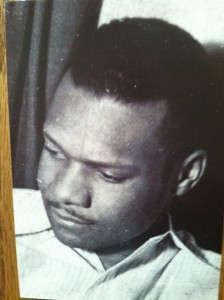 The Du Bois Theater Guild. Richard Durham.
The Du Bois Theater Guild. Richard Durham.

You may not have heard of either the Guild or Durham, but versatility and activism defined them both.
In Chicago during the mid-1940s, the Du Bois Theater Guild mounted theatrical productions that stood out for their creativity and revolutionary spirit. And as one of the co-founders of the Guild, Richard Durham essentially served as the group’s politically outspoken literary muse.
The Guild’s name reflected the fact that distinguished scholar W. E. B. Du Bois had made it possible for grants to come into the black community to support art and culture during the mid-1940s. Some of the Guild’s theatrical performances, like its interpretation of Clifford Odets’ Waiting for Lefty and John Steinbeck’s Of Mice and Men, plays that shamelessly advocated for social change.
When I interviewed Clarice Durham about her husband, she fondly remembered the Du Bois Theater Guild’s performance of Lonesome Train, a cantata about President Lincoln’s assassination and the train that transported his body to his Springfield, Illinois birthplace. Other Guild productions trumpeted black awareness themes. For example, actor Oscar Brown Jr. told me that the Guild “feted” writer Langston Hughes with an original play about Hughes’ popular Jesse B. Simple character.
The Du Bois Theater Guild staged their plays in available school or library auditoriums. But securing consistent bookings was frustrating and fleeting. So actor Janice Kingslow said that Guild members decided to use radio as a realistic performance alternative for Guild members.
In September 1947, Richard Durham and the Du Bois Theater Guild mounted a series called Here Comes Tomorrow – an all-black radio soap opera. Durham called Here Comes Tomorrow “the first authentic radio serial of an American Negro family,” as told through “the unforgettable story of the Redmonds–of their search for happiness and a new world.”
When black World War II veterans returned home, they faced some of the same oppressive conditions they had risked their lives fighting against in Europe. In Here Comes Tomorrow Richard Durham painted an aural portrait of a complex, nuclear black family of six – a family grappling with issues affecting most African Americans in post–World War II America. Listeners entered the Redmonds’ world every Monday, Wednesday, and Friday at 10am on WJJD.
However, the soap’s funding dried up and its run ended in early spring 1948. Before then, Durham contacted NBC and officials at the Chicago Defender newspaper, hoping to convince them to sponsor a new radio series. Durham and his Du Bois Theater Guild colleagues called this new show Destination Freedom.
Once NBC and the Defender agreed to sponsor it, Durham’s list of potential program subjects included strong, principled men and women who fought for freedom, justice and equality. They were African Americans like abolitionists Frederick Douglass and Sojourner Truth, Dr. Daniel Hale Williams and inventor George Washington Carver, educator Mary McLeod Bethune and Black history month creator Carter G. Woodson, athletes Joe Louis and Jackie Robinson, as well as musicians Hazel Scott and Fats Waller.
In Destination Freedom, Durham brought black history, culture and contemporary life to Chicago’s airwaves, making broadcast history in the process.
Have a fantastic Black History Month!
 The Du Bois Theater Guild. Richard Durham.
The Du Bois Theater Guild. Richard Durham.